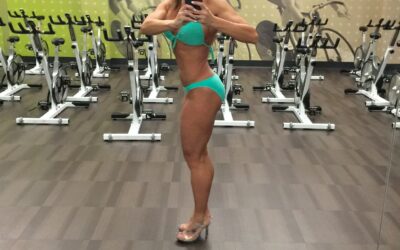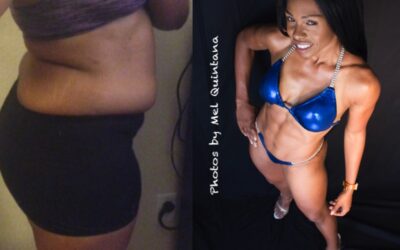What exactly is body recomposition? Body recomposition, or Body recomp for short is when you try to transform your body by gaining muscle and losing fat at the same time. Most of the time we’ve been told that when we want to build the body we want, it’s all about losing weight (not losing fat), or gaining weight (not gaining muscle). When someone attempts a body recomp, it’s a completely different animal. It’s not just about weight. It’s about creating the look that you want. I’ve sat down with hundreds of clients that have said things like “I just want to tone” or “If I weigh that much, I’ll be too skinny!” I’ve even heard “I just want to get big and ripped!’ Seeing that there’s no such thing as “toning a muscle,” and it either gets bigger by adding muscle, gets smaller by losing muscle, or it gets leaner by losing body fat and gaining muscle, if you fall into these scenarios, then body recomp strategies are at least part of your success formula.
Fitness & Viewing the World Through a Straw
It’s a lot of work learning about how exercise affects the body. To simplify things, we often dumb all of the body’s process down to one liners. When we always attempt to describe the whole world with these one liners, we often fail to see the bigger picture. Just like when we attempt to view the world through a straw. That’s a big problem for some of us that perform fitness transformations. If body fat is high, then we cut calories to lose weight. If you need to gain muscle, you drastically increase calories to gain fat, instead of using smaller calorie surpluses to minimize fat gain, and maximize muscle gain (not just weight gain). For body recomp transformations, the devil’s in the details(I’d be willing to argue that this is the case most of the time with personal training). It’s not just about the typical calories in vs calories out strategy. It’s also about your history up until this point. The answers to some of the following questions will play a role in the best strategy for you:
- Were you on a low calorie diet?
- An extremely low calorie diet?
- Eating at maintenance?
- How hard have you been training?
- What type of workouts?
- How long?
- What’s your protein intake?
- What type of foods have you been eating?
For example, I had a client that wanted to recomp her body, but her maintenance was around 1100 calories/day and her body fat was around 28% at 140 lbs, and she already works out 2+ hours/day. Conventional wisdom says I should cut her calories, right? Should she exercise more?
Perfect Candidates For Body Recomp
Body Recomp as the main strategy isn’t for everyone. But I do believe most people can include a phase or two where this becomes the goal. If you’re someone that has large amounts of weight to lose, MOST of your training and nutrition phases should target weight loss. The same is also true for someone that wants to gain a lot of muscle, but already has low body fat.
Let’s talk about the people who are good candidates for body recomposition.
- Skinny Fat People. This is a group of people that the fitness and nutrition industry has done a great disservice. Most of the time, this is a group that may eat enough calories, but their nutrition program lacks nutrient density, or they fail to get in enough foods with high quality nutrients. So if you apply the conventional wisdom, they’ll make this situation worse by cutting calories. They are people that are at a healthy weight/BMI, but they have high body fat levels. Body recomp is right up their alley. For these people making sure they get enough high quality nutrients is going to be important so that they will gain the muscle that they need, even though they won’t be eating with a large calorie surplus to gain weight, while giving the body what it needs to have the healthy metabolism required for fat loss. If you want more insight into how body recomp strategies help those that are Skinny Fat, check out this video. How To Avoid Being Skinny Fat
- People who have been dieting on really low calories, but still aren’t lean. This is usually the result of people believing calories in vs. calories out is the only variable. This can include the Skinny Fat crowd, but it extends beyond that crowd. Whenever you get stuck losing weight there’s two options, or two ways to create a new calorie deficit. You can (a) reduce your food intake, or (b) perform more exercise. You don’t always have to do both at the same time, and people that don’t freak out and do both will often ONLY choose “A.” They also tend to neglect some of the nutritional strategies that I’ll outline later. People that fall into this group will usually. With this group, as well as those that need a break from their usual programming, I’ll usually put them through a 1-3 month phase of body recomp by doing the following:
- Figure out how they were training and how long they were doing it, and change it in a way that compliments their goal. There’s two ways to train to build muscle, you can increase mechanical stress by using low weight/high reps, and/or short rest periods, or you can increase muscular tension by using heavier weights for 6-12 reps. Most people tend to stick to one method because it comes easy for them. Do they completely need a break from short rest periods because they always train with high reps/short rest? If they train with typically train with weights that allow them to perform 10-12 reps, wouldn’t they benefit from using weights that only allow 6-8 reps?
- Fix their calorie intake. Sometimes people in this group are too scared to raise their calories so that you can fix their metabolism. This is one of those instances where it’s about more than caloric deficits. They don’t eat enough to properly fuel their exercise. This when I hit’em on the low with that double whammy. Let me explain. As I mentioned earlier, there’s two ways to create a calorie deficit. Which also means that there’s two ways to create a caloric surplus to help them build muscle which also will slightly increase the amount of calories that there healthier body will burn. I can make them lift heavier with lower reps. Less workout volume burns less calories. So they’ll get more out of the same calorie intake. I’ll also slightly raise the calories by 200-300 calories. A lot of the time, the body will play catch up, and give them the gift of losing a few lbs. of fat along with the muscle that they’ll gain from the change in training. The body will often adjust to overtraining/undereating by slowing down the rate at which it burns calories. The extra calories will allow it to play catch up.
- Inexperienced Lifters – This group does well with body recomp, because everything works. They haven’t been exposed to much, so the body will adjust by getting stronger, losing fat, and gaining muscle, pretty quickly for the first 4-6 weeks. After that, you’d better have a plan.
- Break From Normal Training- The easiest way to help someone out a plateau is to change the way you give them what they need. It’s part of the reason why I’m such a strong advocate for using periodization with my clients. As I mentioned earlier, there’s different variables for fat loss, gaining muscle, and different strategies to use for body recomp. Most people use the same ones over and over. So when they’re stuck, I look at their goals, and their history. If they’ve been training with 6-8 reps for a long time, and they want to gain muscle to either drive their metabolism up, or just to look better. Why not use 10-12 reps, or increase the frequency that they hit their muscles with. There’s various ways to apply the Concept of Progressive Overload to shake things up in a way that you’ll also make the progress you’ve been seeking. I go over all of those variables and ways to use them here Why Your Fitness Program Stopped Working and Why Your Fitness Program Stopped Working Pt. 2 And I also explain how periodization could help you achieve greater results with your fitness transformation Periodization and Your Fitness Transformation. Just make sure your nutrition also matches what you’re trying to accomplish with your workouts.
Ways to Measure Success
Something to think about starting your body recomposition program. Unlike when you try weight loss or muscle building programs, the scale can’t be the main way to measure success. You’re attempting to both lose muscle and gain body fat. If you ONLY use the scale, you could be successful, and not know it, because your weight might not change, even though your body fat does. And the day to day changes may be too small to see for most people. Since body recomp is more about looking great than achieving a certain number on the scale, you might want to look into some ways to measure success without a scale, such as:
- Circumference Measurements Using a measuring tape to measure areas that you’d like to get smaller, or bigger could provide some insight into your progress. For example most people want their waist to get smaller, so you could measure around the belly button. Some women want bigger glutes, and some guys want larger arms, or a bigger chest, and shoulders, so these areas can also get measured. I wouldn’t recommend this as a stand alone method. You can get smaller by losing muscle, just like you can get bigger by gaining fat.
- Body Fat Testing Body fat or body composition is a great way to measure success. Especially when combined with the scale. The problem with using this method is that it can be expensive if you use the most accurate methods (hydrostatic weighing, DEXA…) it can be expensive. Most people using calipers are inexperienced, and in most cases don’t know how to properly choose find the sites. Even using various types of Bioelectrical impedance (BIA) can be suspect because they don’t actually measure body fat. They measure body water, and how fast the signal goes through to body. If you’re dehydrated it will be off, just like it will if you’re retaining water for any reason. You have to make sure you’re in the same condition every time that you test. For example, if I had a client that only had access to this use this method. I’d have them measure at the same time of day, or in the same workout status (before workout, after workout). They should also fix their hydration status by drinking between 16-24 ounces of water, and then waiting to use the restroom before testing (you’ll get rid of the water that you don’t need).
- Pictures Using pictures is probably the most convenient way to measure progress during a body recomp transformation. Everyone has a cellphone with an HD camera, so outside of making the conditions of your testing similar in all cases (and you don’t have to worry about hydration levels) all you have to do is use the same poses, and make sure the light is hitting you in the face(or use the flash when it doesn’t). I also used this to estimate the body fat for online clients, which also allowed me to figure out things like macros, and calorie intake. You’ll get an honest assessment as long as you try to keep the conditions the same for every picture.
I go into a little more detail about Non-Scale ways to measure success in this video Success with Non Scale Measurements… and Looking Good Naked
Sleep & Stress Management
If there was one behavior that that you could correct that would have the largest impact on your fitness goals, what do you think that behavior would be? If you said improve your sleep, you’d be correct.
Sleep affects your ability to burn calories, and it also affects your insulin sensitivity so that your body will have more problems properly using and storing carbs, it’ll also decrease your ability to handle stress, which will lead to further issues with sleep… and this vicious cycle will continue. On top of all that, a lack of quality sleep will increase your cravings for bad foods. So you’ll end up eating more calories, while burning less. You’ll want to work on getting as close to 8 hours of QUALITY sleep every night. This doesn’t include when you get into bed, but when you actually sleep, and stay asleep. I know some of you out there will try to argue with me and say that you can get by with 4 hrs., 5 hrs…but again we need to thrive to make as much progress from out body recomp program, not just survive. Here’s another study for you. They compare two groups of people trying to lose weight. One group slept 8.5 hours/night, and the other group slept only 5.5 hours/night. The group that only slept 5.5 hours/night lost 55% less fat, along with losing 60% more lean body mass.




0 Comments